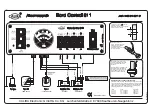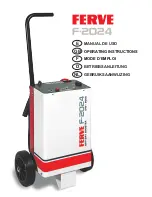
To help increase tire life and
distribute wear more evenly, rotate
the tires every 10,000 miles
(16,000 km) on 4-cylinder models
and 7,500 miles (12,000 km) on
6-cylinder models. Move the tires to
the positions shown in the chart each
time they are rotated. If you
purchase directional tires, rotate
only front-to-back.
It is best to replace all four tires at
the same time. If that is not possible
or necessary, replace the two front
tires or two rear tires as a pair.
Replacing just one tire can seriously
affect your vehicle’s handling.
Replace your tires with radial tires of
the same size, load range, speed
rating, and maximum cold tire
pressure rating (as shown on the
tire’s sidewall).
Mixing radial and bias-ply tires on
your vehicle can reduce braking
ability, traction, and steering
accuracy. Using tires of a different
size or construction can cause the
ABS to work inconsistently.
The ABS works by comparing the
speed of the wheels. When replacing
tires, use the same size originally
supplied with the vehicle. Tire size
and construction can affect wheel
speed and may cause the system to
work.
If you ever replace a wheel, make
sure that the wheel’s specifications
match those of the original wheels.
Replacement wheels are available at
your dealer.
Tire Rotation
Replacing Tires and Wheels
Tires
Ma
int
e
na
nce
241
(For Non-directional
Tires and Wheels)
Front
(For Directional
Tires and Wheels)
Front
Installing improper tires on your
vehicle can affect handling and
stability. This can cause a crash
in which you can be seriously
hurt or killed.
Always use the size and type of
tires recommended in this
owner’s manual.
04/08/05 11:16:06 31SDP620 0244
















































